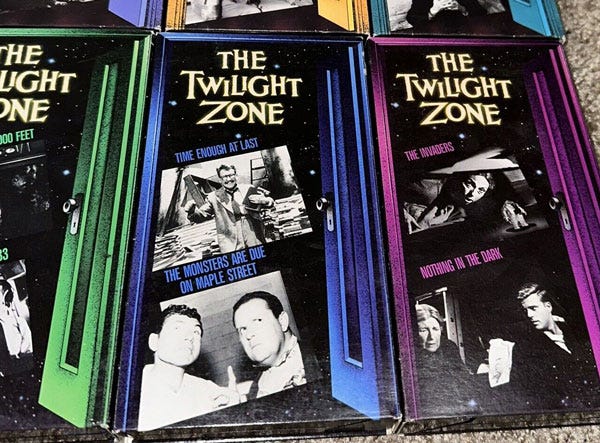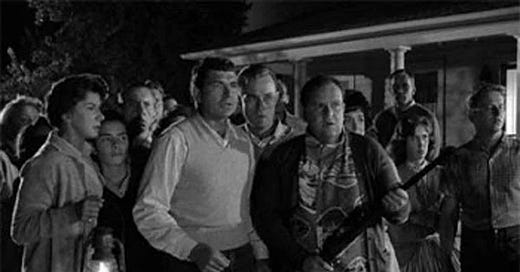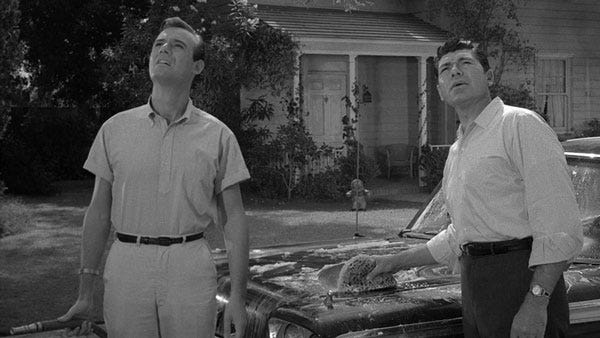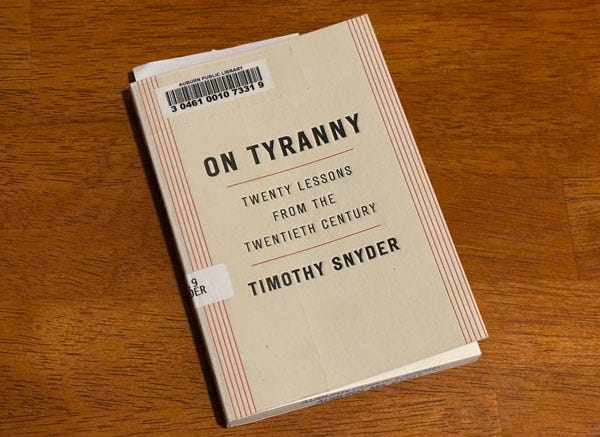Kindness Will Save Us from The Twilight Zone
How simple acts like making eye contact can help fight fascism
Welcome to another edition of Willoughby Hills!
This newsletter explores topics like history, culture, work, urbanism, transportation, travel, agriculture, self-sufficiency, and more.
I recently decided to watch a classic episode of The Twilight Zone called “The Monsters Are Due on Maple Street.” I was in the mood for a “comfort food” show and this particular episode has always been one of my favorites.
I remember my dad turning my sister and me on to The Twilight Zone as kids. Our local Blockbuster Video rented VHS tapes which contained two episodes per cassette. We would agonize over which to choose in the aisle, but without knowing the series well, would often settle on episodes that had catchy titles.

Most people were probably renting the particular Twilight Zone tape that we did most often because it contains perhaps the most infamous episode in the series, “Time Enough At Last.” In that episode, a bank clerk played by Burgess Meredith accidentally survives a nuclear bombing by taking his lunch break in the bank vault so he can read a book in solitude.
But for me, the much more appealing episode on that tape was “The Monsters Are Due on Maple Street” because we happened to live on Maple Street! (Oddly enough, I grew up in the city of Willoughby, which may have also inspired another Twilight Zone episode “A Stop at Willoughby.”)
“Maple Street” is set in a typical 1960s suburban neighborhood that felt very familiar to the streets of my own childhood, despite it being filmed on one of the old MGM backlots. In the episode, neighbors are outside washing cars, mowing lawns, and socializing, when suddenly a dark object passes overhead. The neighbors assume it was some kind of a meteor and pay it little mind.
It is soon discovered that nothing works on Maple Street: the electricity is shut off, the phone lines are dead, even the cars won’t start. At first, the neighbors are all in solidarity and try to determine together what might have happened and how to fix it.
One neighborhood teenage boy plants the idea, seemingly inspired by a comic book or sci-fi movie, that the street could be under alien invasion. He warns that in the stories he’s heard, the aliens often send a scout party in advance disguised as humans to aid in the takeover.
The adults dismiss the teenager’s concerns, although it plants a seed that perhaps one of the neighborhood families isn’t like the others. As day turns to night, everyone in the neighborhood begins to turn on one another, accusing the other families of being outsiders.
The hysteria reaches a fever pitch, with one man killing his neighbor with a rifle because he doesn’t recognize him in the dark. After that, the entire street descends into chaos and violence, with the neighbors destroying each other’s homes and each other.
I have seen this episode perhaps a dozen times in my life, but as the second Trump administration is set to begin soon, I couldn’t help but feel that my recent viewing was more relevant than ever.
In short order, we will likely see mass deportations, the persecution of political enemies and dissidents, and the continued marginalization of minorities of all kinds (racial, gender identity, sexuality, etc). Trump and his team’s rhetoric will dehumanize “out” groups and we will have a choice to make as citizens: will we accept what is being told to us? Will we ignore the way that others are treated as long as it doesn’t affect our own comfort? Perhaps some of us will even join in on the violence.
It may sound far-fetched now, but it happened on Maple Street in a matter of hours.
I’ve heard a lot of people online recently recommending Timothy Snyder’s book On Tryanny, so I went and picked up a copy from the library. Snyder is a historian and history professor at Yale University who has extensively studied the Holocaust and the fascist, communist, and authoritarian governments that rose in Europe throughout the twentieth century.
On Tryanny is a short book with twenty simple lessons on fighting fascism based specifically in twentieth century European lessons. It’s filled with great lessons like “Do not obey in advance” and “Believe in truth.”
But perhaps the one that spoke to me most, both after reading Snyder’s book and after watching The Twilight Zone is “Make eye contact and small talk.”
According to Snyder (emphasis added):
“Tyrannical regimes arose at different times and places in the Europe of the twentieth century, but memoirs of their victims all share a single tender moment. Whether the recollection is of fascist Italy in the 1920s, of Nazi Germany of the 1930s, of the Soviet Union during the Great Terror of 1937-38, or of the purges in communist eastern Europe in the 1940s and '50s, people who were living in fear of repression remembered how their neighbors treated them. A smile, a handshake, or a word of greeting banal gestures in a normal situation- took on great significance. When friends, colleagues, and acquaintances looked away or crossed the street to avoid contact, fear grew. You might not be sure, today or tomorrow, who feels threatened in the United States. But if you affirm everyone, you can be sure that certain people will feel better.”
Of course, we are not going to stop the march of fascism simply by being kind to our neighbors, but I do agree that it’s an important step to begin putting into practice. As Snyder says, we can’t always know what an individual is going through, and a simple, present bit of eye contact may be enough acknowledgment to make somebody feel seen and feel human.
In our modern, phone-based world, it’s easy to ignore the humanity of those around us. We place mobile orders for coffee, dinner, and groceries. We broadcast our lives on social media rather than have face-to-face conversations. We are so engaged in our own screens that we often rarely look up to see who is around us.
Let’s all try, especially as the days get shorter and colder, to bring some more warmth back into our lives. Make eye contact with the barista, genuinely thank the pharmacist, acknowledge the bus driver when boarding. Smile and wave at your neighbors, even if they don’t wave back. Even if they voted differently than you. After all, as I wrote about before the election, how we choose to vote is based on a lifetime of conditioning and programming, which most of us aren’t even willing to acknowledge.
Times are likely going to get much harder, but I hope we can all hold the citizens of Maple Street as the antithesis of how to react. When we see our neighbors, our colleagues, our friends targeted and attacked by our own government, are we going to stand up for them, or are we going to join the mob?
Explore More:
Thanks for reading Willoughby Hills! Subscribe for free to receive new posts and support my work.
Related Reading
Don’t Take the Election Personally
If you’ve missed past issues of this newsletter, they are available to read here.








I am glad you posted this, Heath. I had decided to follow this plan even before reading this post. The last 2 weeks have been rough for me, particularly after the election.
Great post, thanks heath